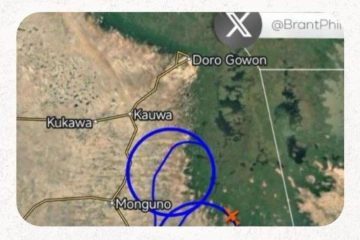Katsina: When Leadership Fails, Terrorists Reign, Malnutrition Flourishes

By Agaju Madugba, Culled from THE SUN NIGERIA | August 25, 2025
In the quiet hours of Tuesday, August 19, 2025, the serene call to prayer echoed through the Anguwan Matau community in Malumfashi Local Government Area of Katsina State.
As the first light of day broke, Muslim faithful made their way to the mosque to observe Salat al-Fajr, the obligatory dawn prayer.
Those who had not yet performed ablution, the ritual purification, hurriedly washed in the open spaces around the mosque before entering its sacred interior. Inside, worshippers engaged in personal supplications, awaiting the Imam’s arrival to lead the congregation.
Moments later, the lines were formed and the prayer began. But what should have been a peaceful communion with God turned into a bloodbath.
According to one survivor, “suddenly, hell enveloped the mosque” as suspected gunmen, believed to be bandits, stormed the premises, unleashing a hail of sizzling bullets on the unsuspecting worshippers.
When the gunfire ceased and silence returned, it was not peace that followed, but horror. Thirteen bodies lay lifeless within the mosque, victims of yet another brutal assault. The Katsina State government confirmed the death toll in a statement released later that day, in a statement.
This massacre is one among many in a relentless wave of violence that has plagued both rural and urban communities across Katsina State.
The perpetrators, commonly referred to as bandits but officially designated as terrorists by the Federal Government, continue to terrorise residents with impunity, leaving behind a trail of blood, shattered lives and deepening fear.
Escalating violence and government response
In numerous instances, bandits have razed homes, shops, and other properties belonging to residents, looting livestock and abducting individuals who are then taken into the forest and held for ransom.
As is often the case, the government responded with a promise to investigate the incident and announced the deployment of additional security forces to the affected area.
However, Deputy Governor Faruk Lawal Jobe issued a more direct appeal on the heels of the Malumfashi mosque murder, saying, “We respectfully request the President, Ahmed Bola Tinubu, to issue matching orders to all security agencies to bring a decisive end to these unprovoked attacks on our peaceful communities.
“The people of Katsina State deserve to live in safety and pursue their livelihoods without fear. Our farmers, traders, and families should not have to live in constant fear. We need our President’s direct intervention to mobilise all necessary resources and provide the security architecture our state requires.”
Understanding the bandits
The immediate past Governor of Katsina State, Aminu Bello Masari, who grappled with the scourge of banditry throughout his eight-year tenure, offered a stark characterisation of the perpetrators.
He described them as: “The forest people with no religion and no humanity, who specialise in killing people with an added hobby of sleeping with women and rearing children like dogs.”
Katsina’s geographical landscape, particularly its vast forested areas, has unfortunately provided cover and operational bases for these criminal groups.
The notorious Rugu Forest alone borders more than 20 of the state’s 34 Local Government Areas, making it a strategic stronghold for bandits.
Communities within these regions live under constant threat, with many residents forced into a life of fear and uncertainty. Some others flee their ancestral homes.
Recent intelligence reports identified approximately 24 terrorist cells operating across these Local Government Areas.
The government has designated these zones as “frontline” areas due to their heightened vulnerability and persistent exposure to attacks.
Why the attacks persist
Despite the various labels: bandits, terrorists or hoodlums, the reality remains unchanged. Katsina State continues to reel under the weight of relentless insecurity.
Nasir Muazu, the Commissioner for Internal Security, has laid bare the troubling dynamics that make the fight against banditry and kidnappings so difficult.
According to him, investigations reveal that some community members actively aid these criminals, providing essential goods at exorbitant prices and profiting from the chaos.
- Fuel is sold to bandits at ₦5,000 per litre
- A bottle of soft drink goes for ₦3,000
- Drugs, normally affordable, are traded for thousands of naira
These profiteering acts not only embolden the criminals but also undermine community cooperation, making it nearly impossible to mount a unified front against the menace.
Shockingly, despite these revelations, no successful prosecutions have been reported, raising serious questions about accountability and political will on the part of the government.
Self-Defence: A Fading Strategy
During the Masari administration, when negotiations and both kinetic and non-kinetic strategies apparently failed, residents were urged to arm themselves, a decision the then government might have considered, perhaps out of frustration after exhausting so many other options.
The directive sparked national outrage and ridicule. How does one confront a bandit wielding multiple AK-47s with Dane guns, cutlasses, or catapults?
The idea, unsurprisingly, fizzled out. Since Masari’s departure in 2023, the insecurity has only worsened, with no clear resolution in sight.
Community Security Watch Corps: Bold step, but costly move
In a bid to stem the tide, Governor Umaru Dikko Radda launched the Katsina Community Security Watch Corps months after his inauguration in May 2023.
Armed with 12 armoured vehicles and other gear, the outfit was designed to bolster the efforts of conventional security forces. Yet, the cost has been steep, officers have lost their lives, and communities continue to grieve.
Government statements condemn the attacks, but the cycle remains unbroken. The people wait, helpless as the bandits strike with impunity.
Dubious awards amid glowing starvation and underdevelopment
Ironically, while the state grapples with violence and poverty, Governor Radda has received a flurry of awards from various organisations, some reputable, others obscure:
- Sports Excellence Award
- Best Performing Governor Award
- Most Outstanding Governor of the Year Award
- Most Data-Friendly Governor Award, and more
These accolades raise eyebrows, especially given the harsh realities on the ground: widespread poverty, underdevelopment and a population struggling to survive and children and nursing mothers battling malnutrition.
In some instances, bandits sack whole communities, turning citizens into refugees in their land while farming, the major source of sustenance, is disrupted with attendant economic consequences.
According to Médecins Sans Frontières, the number of under-five children in Katsina suffering from Severe Acute Malnutrition has so far surged by approximately 208 per cent in 2025 compared to the same period in 2024.
Tragically, the report reveals that some 652 children have died in their facilities since the beginning of the year. This alarming rise is closely linked to persistent banditry across parts of the state, which has severely disrupted access to essential health services.
Some other international aid agencies warn that Katsina may have reached the critical threshold of a Malnutrition Emergency, with Mashi Local Government Area being the most affected.
Moreover, the United Nations Children’s Fund 2024 data further underscores the crisis, showing that only 45 per cent of children in Katsina are fully immunised, a figure that threatens to perpetuate polio virus transmission. Once again, insecurity is cited as a major barrier, preventing immunisation teams from reaching bandit-controlled communities and administering life-saving vaccines.
This convergence of insecurity and malnutrition perhaps demands urgent and coordinated action before more children are lost to a crisis that is preventable.
Certainly, the solution may remain elusive with a leadership that jets out of the country on medical tourism to undisclosed facilities abroad and for equally unknown health challenges.
About the Author
Agaju Madugba is a Nigerian journalist and writer. He has written articles on various topics, including politics, history, and social issues in Nigeria. Specifically, he has written about the Northern Nigeria region, its history, and its development.
One of his notable articles is titled “Sardauna’s Northern Nigeria: 58 years on,” where he discusses the legacy of Sir Ahmadu Bello, the former Premier of Northern Nigeria. He also analyzes the current state of the region, highlighting issues such as poverty, illiteracy, and insecurity












